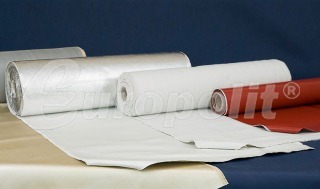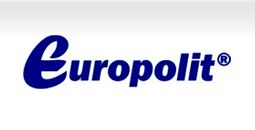
Industrial cloths
Europolit specializes in manufacturing and distribution of specialized technical fabrics for industrial applications.
Glass, ceramic, silica and BIO-TEX fabrics are characterized by a very high thermal resistance, while aramid fabrics - by extreme mechanical resistance.
Glass fabrics may be impregnated with elastomers or coated with aluminum film, which eliminates dusting and increases tightness of material.
Assistant of selection of industrial cloths
The purpose of the application is to facilitate our products' selection for standard applications to distributors, constructors and end users. Selection is made on the basis of simplified criteria and it is only a guideline when selecting the proper material. Any possible errors in the functioning of the application do not constitute the basis for acceptance of the manufacturer of any legal liability for damages arising as a result of improper product use.
-

Aramid fabric type TA/F
The fabric of TA/F type is woven of high quality aramid yarn of continuous fibres, with extremely high mechanical resistance. It is a material intended for strengthening various types of composites and structures with increased resistance to cutting, punctures and other mechanical damages. The fabric may also be used for strengthening fabric compensators, thermal insulations...
see product data sheet -

Aramid fabric type TA/S
The fabric of TA/S type is woven of high quality aramid yarn, with a perfect heat insulating power and a commonly known mechanical strength of aramid. Aramid fabrics are mainly used for thermal insulation of hot elements and to transport various kinds of strongly abrasive and hot materials for production of curtains, sleeves and working uniforms.
see product data sheet -

BIO-TEX fabric type TCW-BIO
The fabric of TCW-BIO type is woven of high quality biosoluble refractory fibres. As opposed to ceramic fibres, this material is not subject to any hygienic restrictions in the EU Member States in accordance with the Q note of Directive 97/69 EC. The used fibres are characterized by perfect thermal stability and keep their original structure to the amount of the maximum temperature...
see product data sheet -

Ceramic fabric type TCW
Ceramic fabric, type TCW is woven of high quality ceramic yarn without reinforcement. The product contains approximately 18% of organic fibres which, in the first period operation, may burn-out without losses for key operation parameters. Ceramic fabrics are applied as thermal insulations for all types of machines, devices systems with contact with high temperatures and...
see product data sheet -

Glass fabric + PTFE type TST
Glass fabric of TST type is woven of glass silk and impregnated with PTFE dispersion. Additionally, the material is laminated on one side with a very thin PTFE film, which guarantees antistatic operation and even better chemical resistance of the fabric. The commonly known high chemical resistance of PTFE in the range of pH 0-14 enables very broad application of the fabric...
see product data sheet -

Glass fabric + VITON® type TSV
Glass fabric of TSV type is woven of glass silk and covered on both sides with FKM rubber of Vioton® type. Thanks to impregnation with fluoric rubber, we obtain a material with very high chemical resistance, recommended especially for production of fabric compensators for power utilities. The fabric may also be used for the production of protective clothing in chemical...
see product data sheet -

Glass fabric HT type TS-HT
Glass fabric of TS-HT type is woven yarn of high quality glass yarn with temperature strength up to 700°C. Fibreglass of HT type, as opposed to ceramic fibres, is not subject to any hygienic restrictions in EU countries. The used fibres are characterized by a perfect thermal stability and keep their original structure to the amount of the maximum temperature of use. An additional...
see product data sheet -

Glass fabric type ST
Glass fabric, type ST is woven with twill from glass silk (glass fibre, type E).
see product data sheet -

Glass metallized fabric type STM
Glass metalized fabric is twill woven of glass silk (glass fibre of type E), and then laminated on one side with polyester film with the thickness of 0.1 mm.
see product data sheet -

Glass metallized fabric type TSM
Glass metalized fabric is woven with a cloth strand of glass textured yarn (type E) and then laminated on one side with aluminum film.
see product data sheet -

Glass silicon fabric type TSSC
Glass fabric of TSSC is woven of glass silk and covered on both sides with high-temperature silicon in red colour. Impregnation with silicon limits dusting of material, provides tightness and water-resistance and increases resistance to mechanical damages. The fabric is used mainly at production of protective clothing, welding curtains, compensators and various types of...
see product data sheet -

Glass silicon fabric type TSSS
Glass fabric of TSSS type is woven of glass silk and covered on one side with grey silicone. Impregnation with silicon limits dusting of material, provides tightness and water-resistance and increases resistance to mechanical damages. The fabric is used mainly at production of protective clothing, welding curtains, compensators and various types of thermal insulation.
see product data sheet -

Reinforced BIO-TEX fabric type TCZ-BIO
The fabric of TCZ-BIO type is woven of high quality biosoluble refractory fibres reinforced with an inconel wire. As opposed to ceramic fibres, this material is not subject to any hygienic restrictions in the EU Member States in accordance with the Q note of Directive 97/69 EC. The used fibres are characterized by perfect thermal stability and keep their original structure...
see product data sheet -

Reinforced ceramic fabric type TCZ
Ceramic fabric, type TCZ is woven of high quality ceramic yarn reinforced with an inconel wire. The product contains approximately 18% of organic fibres which, in the first period operation, may burn-out without losses for key operation parameters. Ceramic fabrics are applied as thermal insulations for all types of machines, devices systems with contact with high temperatures...
see product data sheet -

Reinforced ceramic fabric type TCZ-HT
Ceramic fabric of TCZ-HT type is woven of aluminosilicate yarn reinforced with molybdenum steel, which guarantees thermal resistance at temperatures up to 1400°C. The product contains approximately 18% of organic fibres which, in the first period operation, may burn-out without losses for key operation parameters. Ceramic fabrics are applied as thermal insulations for all...
see product data sheet -

Reinforced glass fabric type TSZ
Glass fabric of type TSZ is woven of high quality glass textured yarn (E type fibre) reinforced with an inconel wire. Glass fabrics are applied as thermal insulations for all types of machines, devices systems with contact with high temperatures and where we want to reduce the heat flow. Particularly often they are used as thermal screens, insulations in the process of...
see product data sheet -

Reinforced glass silicon fabric type TSSZC
Glass fabric of TSSZC type is woven of glass silk and covered on both sides with thick silicon of high temperature in red colour, additionally enriched with UV stabilizer. Reinforcement of each strand with a stainless steel wire significantly increases the mechanical resistance of the material in high-temperature applications. Impregnation with silicon limits dusting of material,...
see product data sheet -

Silica fabric type TK-AR
Silica fabric of TK-AR type is a thermal insulation fabric applied as thermal insulation for all types of machines, devices and systems with contact with high temperatures and where we want to reduce the heat flow. It is used particularly often as thermal screens, insulations in the process of heating welded structures or sleeves of hoses of cables working near heat sources....
see product data sheet -

Textured glass fabric type TS
Glass fabric of TS type is woven of high glass textured yarn (E type fibre) resistant to very high temperature. Glass fabrics are applied as thermal insulations for all types of machines, devices systems with contact with high temperatures and where we want to reduce the heat flow. They are particularly often used as thermal screens, insulations in the process of heating...
see product data sheet




